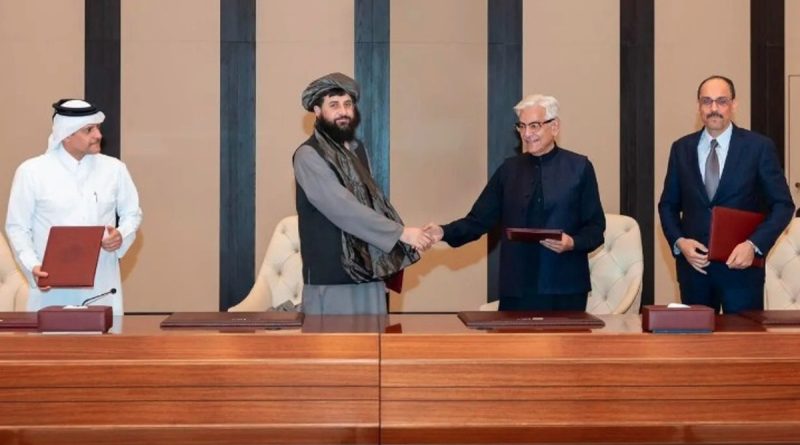Pakistan, Afghanistan reach ‘immediate ceasefire’ deal in Qatar after deadly border strikes
Pakistan and Afghanistan have agreed to an “immediate ceasefire” following days of intense border clashes that left dozens dead, including at least ten civilians killed in Pakistani airstrikes on Afghan territory.
The breakthrough came after high-level peace talks in Doha, Qatar, where representatives from both countries met under the mediation of Qatari officials.
According to a statement released early Sunday by Qatar’s Foreign Ministry, the two sides “agreed to an immediate ceasefire and to establish mechanisms that would ensure lasting peace and stability between the two countries.”
Follow-up meetings are scheduled in the coming days to monitor compliance with the truce.
Pakistan’s Defence Minister Khawaja Asif confirmed the development, announcing that both sides would reconvene in Istanbul on October 25 to continue peace discussions.
“Terrorism originating from Afghan soil and targeting Pakistan will cease immediately. Both nations have pledged to respect each other’s sovereignty,” Asif wrote on X (formerly Twitter).
Afghanistan’s government also confirmed the truce through its spokesperson Zabihullah Mujahid, who described it as a mutual commitment to halt hostilities.
“It was decided that both countries will not engage in any hostile actions or support groups acting against the other,” Mujahid stated.
A photograph posted by both defence ministries showed the two sides shaking hands after signing the ceasefire document.
The ceasefire follows the most serious escalation between the two neighbours since the Taliban’s return to power in 2021.
DAILY POST had reported that a previous 48-hour truce had briefly halted hostilities before being shattered by Pakistani airstrikes on Friday, which Afghan officials said targeted three sites in Paktika province, killing ten civilians, including two children and three local cricket players.
Afghan officials accused Islamabad of unprovoked aggression, while Pakistan maintains that its actions were aimed at militants from the Tehreek-e-Taliban Pakistan (TTP) allegedly operating from safe havens across the Afghan border, an accusation the Taliban government continues to deny.
The violence erupted on October 11, just days after Taliban Foreign Minister Amir Khan Muttaqi visited India, Pakistan’s long-time rival, for the first time, an event analysts say may have added to the regional tensions.
Local reports from the Spin Boldak district in southern Afghanistan on Sunday suggested a cautious return to calm.
“For now, the situation is returning to normal,” said Saadullah Torjan, a local minister. “But there is still a sense of fear. People worry the fighting could resume.”
Security experts warn that the ceasefire may only hold if both sides take concrete steps to curb militant movements along their shared 2,600-kilometre border.
Since the Taliban takeover, Pakistan has witnessed a surge in cross-border militant attacks, prompting Islamabad to accuse Kabul of harbouring insurgents emboldened by the Taliban’s victory over U.S.-backed forces in 2021.
